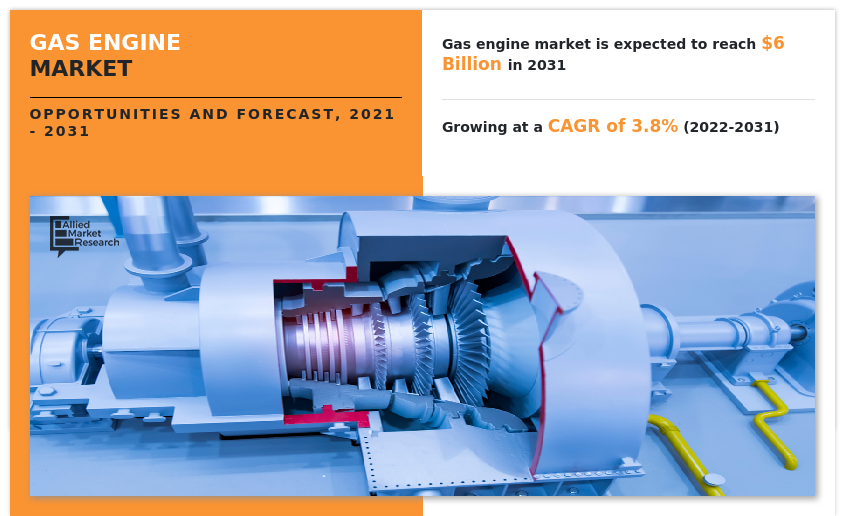
Gas engine market: $4.2 billion in 2021, projected to reach $6.0 billion by 2031, with a 3.8% CAGR from 2022

WILMINGTON, DE , UNITED STATES, June 19, 2024 /EINPresswire.com/ -- The global gas engine market size was valued at $4.2 billion in 2021, and gas engines industry is projected to reach $6.0 billion by 2031, growing at a CAGR of 3.8% from 2022 to 2031.
𝐃𝐨𝐰𝐧𝐥𝐨𝐚𝐝 𝐅𝐮𝐥𝐥 𝐑𝐞𝐩𝐨𝐫𝐭 𝐒𝐚𝐦𝐩𝐥𝐞 𝐏𝐃𝐅:
https://www.alliedmarketresearch.com/request-sample/A07836
The gas engine market has witnessed substantial growth in recent years, driven by various factors such as increasing energy demand, environmental concerns, and advancements in technology. Gas engines, also known as natural gas engines or spark-ignition engines, have emerged as a viable alternative to traditional diesel engines in various applications, including power generation, transportation, and industrial processes.
One of the primary drivers of the gas engine market is the growing demand for cleaner and more sustainable energy solutions. Gas engines offer significant environmental benefits compared to diesel engines, including lower emissions of pollutants such as particulate matter, nitrogen oxides (NOx), and sulfur dioxide (SO2). This has led to increased adoption of gas engines in power generation applications, particularly in regions with stringent environmental regulations.
𝐁𝐮𝐲 𝐍𝐨𝐰 & 𝐆𝐞𝐭 𝐄𝐱𝐜𝐥𝐮𝐬𝐢𝐯𝐞 𝐃𝐢𝐬𝐜𝐨𝐮𝐧𝐭 𝐎𝐧 𝐓𝐡𝐢𝐬 𝐑𝐞𝐩𝐨𝐫𝐭:
https://www.alliedmarketresearch.com/checkout-final/c48bb62d9be4097c3b3c5cbbed86acbc
Moreover, the abundant availability of natural gas and its relatively low cost compared to diesel fuel have made gas engines economically attractive for both stationary and mobile applications. Natural gas is also considered a more secure energy source compared to oil, as it is less susceptible to price volatility and supply disruptions.
Efficiency: Gas engines are highly efficient, with some models achieving efficiency levels comparable to or even higher than diesel engines. This translates to lower fuel consumption and operating costs, making gas engines a cost-effective solution for power generation and other applications.
Flexibility: Gas engines can run on a variety of gaseous fuels, including natural gas, biogas, landfill gas, and synthetic gases derived from biomass or waste materials. This flexibility allows users to choose the most suitable fuel source based on availability, cost, and environmental considerations.
Reliability: Gas engines are known for their robust design and reliable performance, making them suitable for continuous operation in demanding industrial environments. With proper maintenance, gas engines can deliver years of trouble-free service, minimizing downtime and maximizing productivity.
Low Emissions: As mentioned earlier, gas engines produce lower emissions of pollutants compared to diesel engines, making them an environmentally friendly choice for applications where emissions control is a priority. This is particularly important in urban areas and sensitive ecosystems where air quality is a concern.
Decentralized Power Generation: Gas engines are well-suited for decentralized power generation applications, where electricity is generated on-site or close to the point of consumption.
𝐌𝐚𝐤𝐞 𝐚𝐧 𝐈𝐧𝐪𝐮𝐢𝐫𝐲:
https://www.alliedmarketresearch.com/purchase-enquiry/A07836
𝐊𝐞𝐲 𝐌𝐚𝐫𝐤𝐞𝐭 𝐏𝐥𝐚𝐲𝐞𝐫𝐬:
Kawasaki Heavy Industries, Ltd.
Yanmar Co Ltd.
Mitsubishi Heavy Industries, Ltd.
INNIO
Cummins Inc.
China Yuchai International Limited
Siemens AG
Rolls-Royce plc
Doosan Corporation
Hyundai Heavy Industries Co. Ltd.
𝐊𝐞𝐲 𝐅𝐢𝐧𝐝𝐢𝐧𝐠𝐬 𝐨𝐟 𝐭𝐡𝐞 𝐒𝐭𝐮𝐝𝐲:
In 2019, the electro-diesel segment accounted for majority of the share of the global hybrid train market, and is expected to maintain its lead throughout the forecast period.
In 2019, the passenger segment accounted for about 88.4% of share in the global hybrid train market, and is expected to maintain its dominance till the end of the forecast period.
In 2019, the 100-200 km/hr segment accounted for 51.3% market share in 2019, and is anticipated to grow at a rate of 6.8% in terms of revenue, increasing its share in the global hybrid train market.
The passenger segment is the fastest-growing application segment in the Asia-Pacific hybrid train market, and is expected to grow at a CAGR of 6.6% during 2020-2027.
Asia-Pacific is expected to grow at the fastest rate, registering a CAGR of 6.8%, during the forecast period.
In 2019, Europe dominated the global hybrid train market with more than 39.6% of the market share in terms of revenue
David Correa
Allied Market Research
+1 800-792-5285
email us here
Visit us on social media:
Facebook
Twitter
EIN Presswire does not exercise editorial control over third-party content provided, uploaded, published, or distributed by users of EIN Presswire. We are a distributor, not a publisher, of 3rd party content. Such content may contain the views, opinions, statements, offers, and other material of the respective users, suppliers, participants, or authors.

